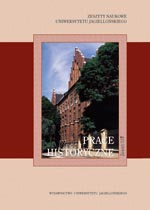Słowianie południowi w koncepcji wzajemności słowiańskiej Karla Havlíčka Borovskiego
The South Slavs in the Concept of Slavic Mutual Cooperation by Karel Havlíček Borovský
Author(s): Jan PešinaSubject(s): History
Published by: Wydawnictwo Uniwersytetu Jagiellońskiego
Keywords: Polish history; general history; ancient history; medieval history; modern history; contemporary history; political history; military; economic and social history
Summary/Abstract: The beginnings of the Czech independent political journalism are intrinsically connected with the person of Karel Havlíček Borovský, a writer, a journalist and an activist. In 1846–1851 he subsequently worked as the editor of three nationalistic and liberal journals: Pražské Noviny, Národní Noviny and Slovan. In Pražské Noviny he published a series of polemical articles entitled Slovan a Čech (1846). It was a manifest, considered by contemporary scholars to be the first Czech political programme which prioritised the Czech national issues over the general Slavic interests, thereby demystifying the myth of Slavic commonwealth. The point of reference was the concept of Slavic reciprocity formulated by Ján Kollár (On the literary reciprocity between Slav tribes and vernaculars). Havlíček appreciated the idea of close cultural cooperation between the Slavic nations, but he rejected the concept of considering all Slavs as one people. Havlíček reduced the idealistic project of Kollár in the spirit of Austroslavism and arrived at an idea of pragmatic and mutually beneficial cooperation between the Czechs and the South Slavs in the area of culture, economy and politics. When evaluated from the contemporary vantage point, the influence of Havlíček’s ideas upon the Czech socio-political thought is visible in the presence of the South Slavic orientation in the international relations policy adopted by the Czech Republic.
Journal: Prace Historyczne
- Issue Year: 137/2010
- Issue No: 1
- Page Range: 89-96
- Page Count: 8
- Language: Polish

